七年级英语第6单元知识点
- 格式:docx
- 大小:37.78 KB
- 文档页数:5
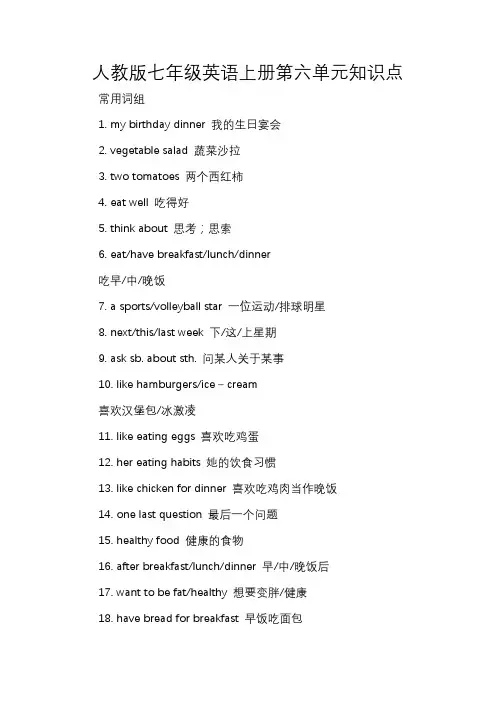
人教版七年级英语上册第六单元知识点常用词组1. my birthday dinner 我的生日宴会2. vegetable salad 蔬菜沙拉3. two tomatoes 两个西红柿4. eat well 吃得好5. think about 思考;思索6. eat/have breakfast/lunch/dinner吃早/中/晚饭7. a sports/volleyball star 一位运动/排球明星8. next/this/last week 下/这/上星期9. ask sb. about sth. 问某人关于某事10. like hamburgers/ice-cream喜欢汉堡包/冰激凌11. like eating eggs 喜欢吃鸡蛋12. her eating habits 她的饮食习惯13. like chicken for dinner 喜欢吃鸡肉当作晚饭14. one last question 最后一个问题15. healthy food 健康的食物16. after breakfast/lunch/dinner 早/中/晚饭后17. want to be fat/healthy 想要变胖/健康18. have bread for breakfast 早饭吃面包19. a lot of strawberries=lots of strawberries=many strawberries 许多草莓20. a lot of rice=lots of rice=much rice许多米饭重点句型1. —Do you like salad? 你喜欢沙拉吗?—Yes, I do./No, I don't.是的,我喜欢。
/不,我不喜欢。
2. —Does she like tomatoes? 她喜欢西红柿吗?—No, she doesn't. She doesn't like them.不,她不喜欢。
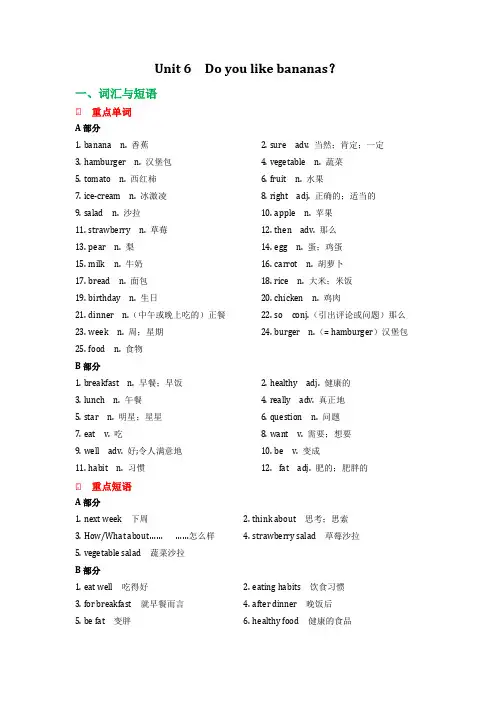
Unit 6 Do you like bananas?一、词汇与短语● 重点单词A部分1.banana n. 香蕉2.sure adv. 当然;肯定;一定3.hamburger n. 汉堡包4.vegetable n. 蔬菜5.tomato n. 西红柿6.fruit n. 水果7.ice-cream n. 冰激凌8.right adj. 正确的;适当的9.salad n. 沙拉10.apple n. 苹果11.strawberry n. 草莓12.then adv. 那么13.pear n. 梨14.egg n. 蛋;鸡蛋k n. 牛奶16.carrot n. 胡萝卜17.bread n. 面包18.rice n. 大米;米饭19.birthday n. 生日20.chicken n. 鸡肉21.dinner n.(中午或晚上吃的)正餐22.so conj.(引出评论或问题)那么23.week n. 周;星期24.burger n.(= hamburger)汉堡包25.food n. 食物B部分1.breakfast n. 早餐;早饭2.healthy adj. 健康的3.lunch n. 午餐4.really adv. 真正地5.star n. 明星;星星6.question n. 问题7.eat v. 吃8.want v. 需要;想要9.well adv. 好;令人满意地10.be v. 变成11.habit n. 习惯12.fat adj. 肥的;肥胖的● 重点短语A部分1.next week 下周2.think about 思考;思索3.How/What about…… ……怎么样4.strawberry salad 草莓沙拉5.vegetable salad 蔬菜沙拉B部分1.eat well 吃得好2.eating habits 饮食习惯3.for breakfast 就早餐而言4.after dinner 晚饭后5.be fat 变胖6.healthy food 健康的食品7.a sports star 一位体育明星8.a volleyball star 一位排球明星9.ask sb. about sth. 问某人关于某事10.one last question 最后一个问题11.want to do sth. 想要做某事● 重点句子A部分1.Do you like salad? 你喜欢沙拉吗?2.John's birthday dinner is next week. 约翰的生日聚会在下周。
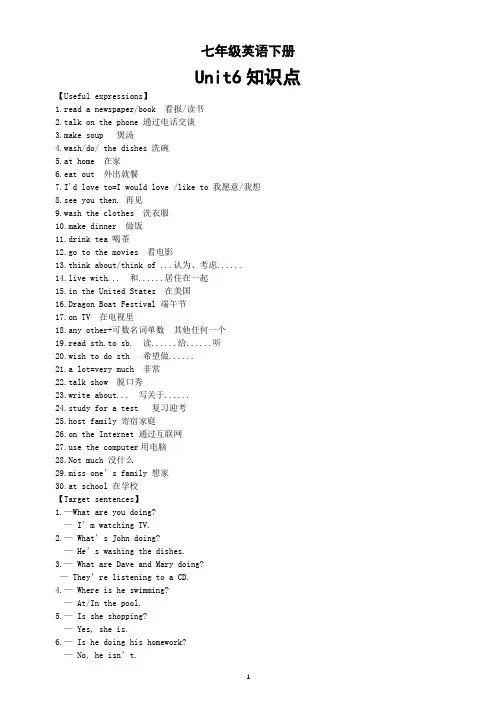
七年级英语下册Unit6知识点【Useful expressions】1.read a newspaper/book 看报/读书2.talk on the phone 通过电话交谈3.make soup 煲汤4.wash/do/ the dishes 洗碗5.at home 在家6.eat out 外出就餐7.I'd love to=I would love /like to 我愿意/我想8.see you then. 再见9.wash the clothes 洗衣服10.make dinner 做饭11.drink tea 喝茶12.go to the movies 看电影13.think about/think of ...认为、考虑......14.live with... 和......居住在一起15.in the United States 在美国16.Dragon Boat Festival 端午节17.on TV 在电视里18.any other+可数名词单数其他任何一个19.read sth.to sb. 读......给......听20.wish to do sth 希望做......21.a lot=very much 非常22.talk show 脱口秀23.write about... 写关于......24.study for a test 复习迎考25.host family 寄宿家庭26.on the Internet 通过互联网e the computer用电脑28.Not much 没什么29.miss one’s family 想家30.at school 在学校【Target sentences】1.—What are you doing?—I’m watching TV.2.—What’s John doing?—He’s washing the dishes.3.— What are Dave and Mary doing?—They’re listening to a CD.4.— Where is he swimming?— At/In the pool.5.— Is she shopping?— Yes, she is.6.— Is he doing his homework?—No, he isn’t.7.—Are you doing your homework?—No,I'm not.I'm cleaning my room.8.Do you want to join me for dinner?9.What do you think of his home in China?10.His dad and uncle are watching the boat races on TV.11.The mother is reading a story to her young children.12.He's talking on the phone to/with his cousin in Shenzhen.13.Zhu Hui misses his family and hopes to have his mom's delicious zongzi.14.But there's still no place like homehome.15.Zhu Hui loves New York and his host family a lot.【Language points】1.He is reading a newspaper.newspaper n.报纸为可数名词,“看报纸”要用read a newspaper.【易混辨析】in the newspaper与on the newspaperLook! Your photo is in the newspaper.看!你的照片上报纸了。
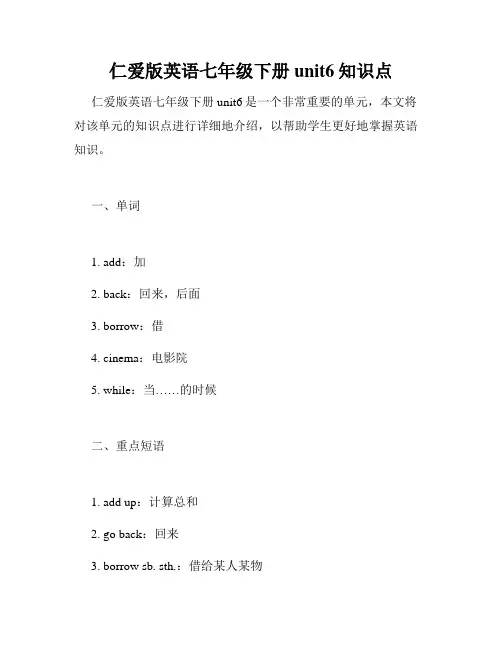
仁爱版英语七年级下册unit6知识点仁爱版英语七年级下册unit6是一个非常重要的单元,本文将对该单元的知识点进行详细地介绍,以帮助学生更好地掌握英语知识。
一、单词
1. add:加
2. back:回来,后面
3. borrow:借
4. cinema:电影院
5. while:当……的时候
二、重点短语
1. add up:计算总和
2. go back:回来
3. borrow sb. sth.:借给某人某物
4. go to the cinema:去电影院
5. while doing:在做……的时候
三、语法
1. There be句型
There be句型表示“有”、“存在”之意,例如:There is a book on the desk.即桌子上有一本书。
2. 句型I'm + doing sth.
这种结构常用来表达我们正在做某件事情,例如:I'm playing basketball. 即我正在打篮球。
四、例句
1. There is a cinema near our school.(我们学校附近有一家电影院。
)
2. I'm studying English while listening to music.(我边听音乐边学英语。
)
3. Can I borrow your pen for a moment?(我可以借用你的笔一下吗?)
总结
通过对仁爱版英语七年级下册unit6的学习,我们了解了很多单词、短语和语法结构。
好的掌握这些知识点,一定会对我们的英语学习帮助很大。
希望大家能够认真学习,并不断提高自己的英语能力。
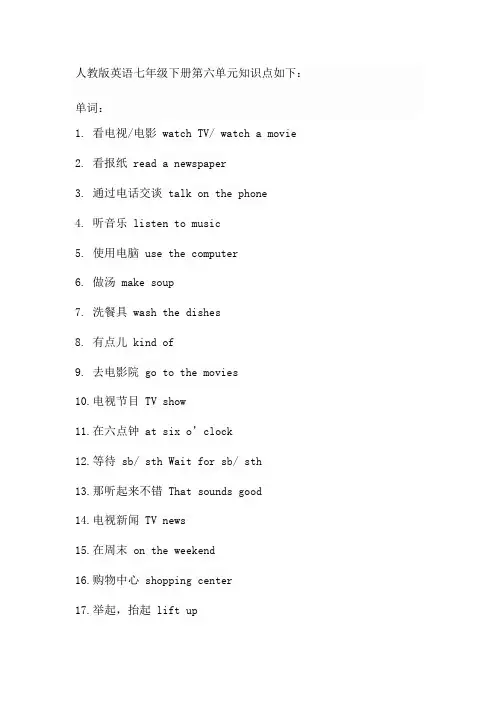
人教版英语七年级下册第六单元知识点如下:单词:1.看电视/电影 watch TV/ watch a movie2.看报纸 read a newspaper3.通过电话交谈 talk on the phone4.听音乐 listen to music5.使用电脑 use the computer6.做汤 make soup7.洗餐具 wash the dishes8.有点儿 kind of9.去电影院 go to the movies10.电视节目 TV show11.在六点钟 at six o’clock12.等待 sb/ sth Wait for sb/ sth13.那听起来不错 That sounds good14.电视新闻 TV news15.在周末 on the weekend16.购物中心 shopping center17.举起,抬起 lift up18.倒掉,倾倒 pour out19.报警 call the police20.报警电话 the police phone number21.消防电话 the fire phone number22.帮助,救援 help, rescue23.伤,受伤 hurt24.丢失,失落 lost25.迷路,迷失 lost way26.希望希望 hope to do sth/ hope that+句子27.想要,需要 want to do sth/ need sth28.谢谢你的帮助 Thank you for your help29.在乡下 in the countryside30.野餐 have a picnic31.湖,湖泊 lake32.在湖边 on the lake33.山,山峦 mountain34.在山顶 on the top of the mountain35.高楼大厦 tall building36.银行 bank37.超市 super market38.公园 park39.自然自然 nature40.电影院电影院 cinema41.剧院 theatre42.书店 book store43.学校 school44.医院 hospital45.大街,街道 street46.邮局 post office47.工厂 factory48.警察局 police station49.超市 super market50.银行 bank51.医院 hospital52.学校 school53.剧院 theatre54.公园 park55.图书馆 library56.购物中心 shopping center57.餐馆 restaurant。
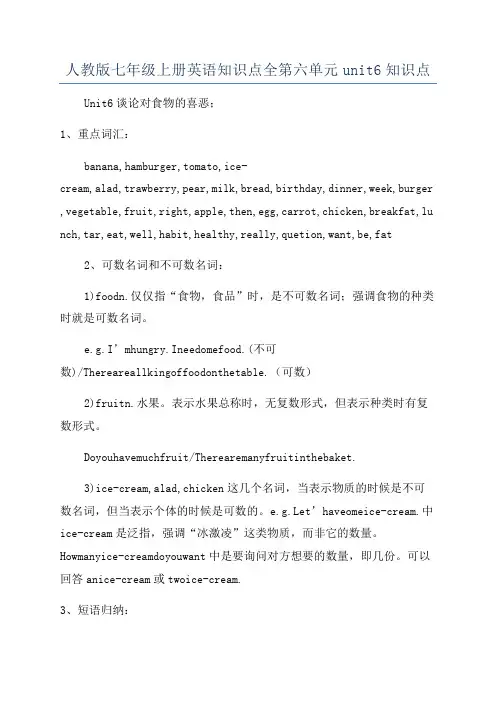
人教版七年级上册英语知识点全第六单元unit6知识点Unit6谈论对食物的喜恶;1、重点词汇:banana,hamburger,tomato,ice-cream,alad,trawberry,pear,milk,bread,birthday,dinner,week,burger ,vegetable,fruit,right,apple,then,egg,carrot,chicken,breakfat,lu nch,tar,eat,well,habit,healthy,really,quetion,want,be,fat2、可数名词和不可数名词:1)foodn.仅仅指“食物,食品”时,是不可数名词;强调食物的种类时就是可数名词。
e.g.I’mhungry.Ineedomefood.(不可数)/Thereareallkingoffoodonthetable.(可数)2)fruitn.水果。
表示水果总称时,无复数形式,但表示种类时有复数形式。
Doyouhavemuchfruit/Therearemanyfruitinthebaket.3)ice-cream,alad,chicken这几个名词,当表示物质的时候是不可数名词,但当表示个体的时候是可数的。
e.g.Let’haveomeice-cream.中ice-cream是泛指,强调“冰激凌”这类物质,而非它的数量。
Howmanyice-creamdoyouwant中是要询问对方想要的数量,即几份。
可以回答anice-cream或twoice-cream.3、短语归纳:John’birthdaydinner约翰的生日晚餐ne某tweek下周thinkabout思考,考虑howabout怎么样omefruit一些水果hibirthday他的生日porttar体育明星eatinghabit饮食习惯forbreakfat作为早餐fordinner作为晚餐onelatquetion最后一个问题healthyfood健康的食品3、tomato可数n.“西红柿”复数形式:tomatoe人教版七上2022知识点总结全类似的以o结尾的名词,需加–e构成复数形式的单词还有potato,hero但photo等词而是以加—构成复数形式的。
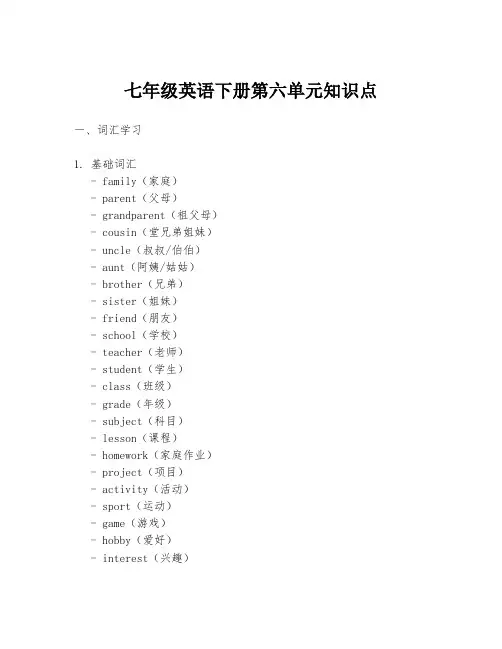
七年级英语下册第六单元知识点一、词汇学习1. 基础词汇- family(家庭)- parent(父母)- grandparent(祖父母)- cousin(堂兄弟姐妹)- uncle(叔叔/伯伯)- aunt(阿姨/姑姑)- brother(兄弟)- sister(姐妹)- friend(朋友)- school(学校)- teacher(老师)- student(学生)- class(班级)- grade(年级)- subject(科目)- lesson(课程)- homework(家庭作业)- project(项目)- activity(活动)- sport(运动)- game(游戏)- hobby(爱好)- interest(兴趣)2. 动词短语- go to school(上学)- study English(学习英语)- do homework(做家庭作业)- play sports(进行体育运动)- watch TV(看电视)- read books(读书)- listen to music(听音乐)- talk with(与...交谈)3. 常用表达- I have...(我有...)- He/She is...(他/她是...)- They are...(他们/她们是...)- We are in the same class.(我们在同一个班级。
)- My favorite subject is...(我最喜欢的科目是...)- I like to...(我喜欢...)二、语法要点1. 一般现在时- 描述习惯性动作或状态。
- 使用动词原形,第三人称单数时动词要加 -s 或 -es。
2. 代词- 主格代词:I, you, he, she, it, we, they 用于句子主语。
- 宾格代词:me, you, him, her, it, us, them 用于句子宾语。
3. 形容词性物主代词- my(我的)- your(你的/你们的)- his(他的)- her(她的)- its(它的)- our(我们的)- their(他们的/她们的/它们的)4. 名词性物主代词- mine(我的)- yours(你的/你们的)- his(他的)- hers(她的)- its(它的)- ours(我们的)- theirs(他们的/她们的/它们的)5. 介词- in(在...里)- on(在...上)- at(在...处)- with(和...一起)- for(为了)6. 特殊疑问词- Who(谁)- What(什么)- Where(哪里)- When(何时)- Why(为什么)- How(怎样)三、句型结构1. 简单句- 主语 + 动词 + 宾语/状语例如:I go to school every day.(我每天上学。
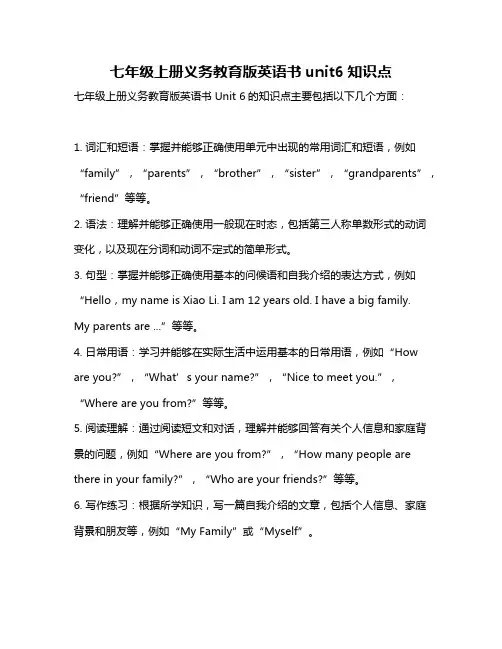
七年级上册义务教育版英语书unit6知识点
七年级上册义务教育版英语书Unit 6的知识点主要包括以下几个方面:
1. 词汇和短语:掌握并能够正确使用单元中出现的常用词汇和短语,例如“family”,“parents”,“brother”,“sister”,“grandparents”,“friend”等等。
2. 语法:理解并能够正确使用一般现在时态,包括第三人称单数形式的动词变化,以及现在分词和动词不定式的简单形式。
3. 句型:掌握并能够正确使用基本的问候语和自我介绍的表达方式,例如“Hello,my name is Xiao Li. I am 12 years old. I have a big family.
My parents are ...”等等。
4. 日常用语:学习并能够在实际生活中运用基本的日常用语,例如“How are you?”,“What’s your name?”,“Nice to meet you.”,“Where are you from?”等等。
5. 阅读理解:通过阅读短文和对话,理解并能够回答有关个人信息和家庭背景的问题,例如“Where are you from?”,“How many people are there in your family?”,“Who are your friends?”等等。
6. 写作练习:根据所学知识,写一篇自我介绍的文章,包括个人信息、家庭背景和朋友等,例如“My Family”或“Myself”。
以上是Unit 6的主要知识点,要掌握这些知识点需要大量的练习和反复的实践。
同时,要注重英语口语和听力的训练,以便在实际生活中更好地运用英语进行交流。
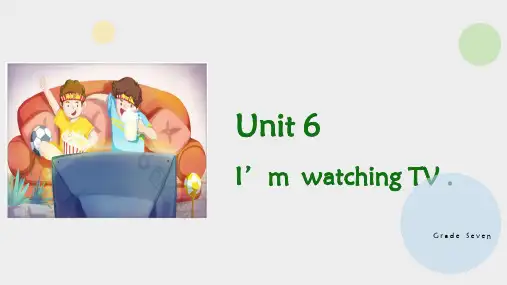

七年级上册英语第六单元笔记以下是七年级上册英语第六单元的笔记,供您参考:第六单元主题:购物重点单词:1. 收款台:收银台,结账处2. 便宜:affordable3. 昂贵:expensive4. 质量:quality5. 选择:choice6. 服务:service7. 感谢:grateful8. 鞋子:shoes9. 衣服:clothes10. 价格:price重点短语:1. 讨价还价:bargain2. 物有所值:good value for money3. 想要某物:want sth4. 打折:discount5. 给某人提供某物:offer sb sth6. 需要某物:need sth7. 试穿某物:try on sth8. 买下某物:buy sth9. 想要购买某物:want to buy sth10. 想要试穿某物:want to try on sth重点句型:1. 询问价格:How much is it?2. 询问质量:How does it feel?3. 询问款式:What style does it have?4. 询问尺寸:What size does it come in?5. 表达感谢:Thank you very much.6. 讨价还价:Can you give me a discount?7. 决定购买:I’ll take it.8. 表达遗憾:I’m sorry, we don’t have that in your size.9. 推荐其他商品:I recommend this one. It’s very popular.10. 表达不满:The service here is terrible!重点语法点:1. 现在进行时态(表示正在进行的动作)2. 祈使句(表示请求或命令)3. 感叹句(表示强烈的感情)。
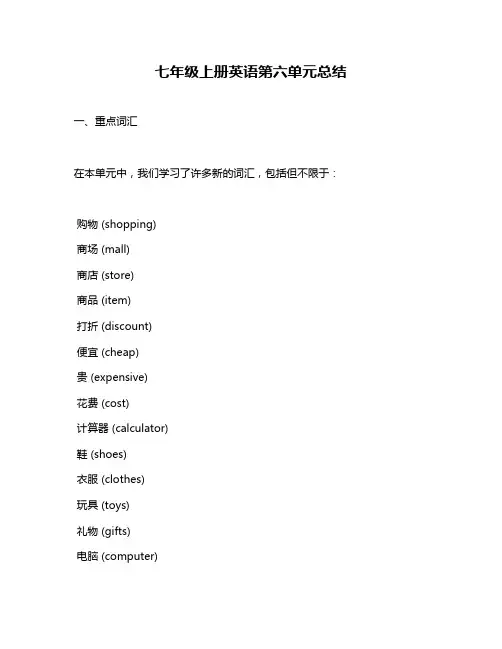
七年级上册英语第六单元总结一、重点词汇在本单元中,我们学习了许多新的词汇,包括但不限于:购物 (shopping)商场 (mall)商店 (store)商品 (item)打折 (discount)便宜 (cheap)贵 (expensive)花费 (cost)计算器 (calculator)鞋 (shoes)衣服 (clothes)玩具 (toys)礼物 (gifts)电脑 (computer)手机 (cellphone)电视 (TV)微波炉 (microwave)电饭煲 (rice cooker)二、主要句型在第六单元中,我们学习了以下主要的句型:1. "How much does it cost?" - "It costs $XX."2. "How much does it cost to buy a TV?" - "It costs $XX."3. "I need to buy a new pair of shoes." - "There are several stores in the mall that sell shoes."4. "This pair of shoes is too expensive." - "You might want to try another store."5. "I can't find the calculator I was looking for." - "You might want to try another store."6. "Do you have any discounts?" - "Yes, we do. XX% off for students."7. "Do you want to buy this pair of shoes?" - "Yes, I do." / "No, Idon't."8. "How much are these clothes?" - "They are $XX each."9. "I want to buy a gift for my friend." - "There are some nice toys in this store."10. "Do you want to come with me to the mall?" - "Yes, I do." / "No, I don't."三、语法重点在本单元中,我们重点学习了询问物品价格和进行购物对话的常用表达方式。
七年级上册英语第六单元笔记思维导Unit 6: Our Local AreaVocabulary:1. neighborhood - The area surrounding a person’s home.2. community - A group of people living in the same area.3. suburbs - Residential areas located on the outskirts of a city.4. downtown - The central business district of a city.5. transport - The system or means of moving people or goods from one place to another.6. environment - The surroundings or conditions in which a person, animal, or plant operates.7. pollution - The introduction of harmful substances into the environment.8. pedestrian - A person who is walking.9. vehicle - A machine used to transport people or goods.10. nature - The physical world that includes plants, animals, and landscapes.Grammar:1. Present Continuous Tense:- Used to describe actions happening at the moment of speaking.- Formed by using the verb “to be” (am, is, are) + verb + -ing.- Example: We are walking to the park.2. Prepositions of Place:- Used to show the position or location of something in relation to something else.- Examples: in, on, at, under, next to, between, etc.- Example: The school is located next to the library.3. Adjectives:- Words used to describe nouns.- Example: The beautiful flowers are blooming in the garden.4. Articles:- “A” is used before words that begin with a consonant sound.- “An” is used before words that begin with a vowel sound.- “The” is used before specific nouns.- Example: An apple fell from the tree.Speaking:- Describe your neighborhood using the vocabulary words.- Talk about the environment and things you like to do in your local area.- Discuss ways to reduce pollution in your community.Writing:- Write a paragraph about a typical day in your neighborhood.- Describe your daily routine, places you visit, and activities you do.- Include details about the people, transport, and nature in your area.Listening:- Listen to a conversation about a neighborhood party.- Answer questions about the location, time, and activities at the event.- Practice listening for specific details and comprehension.Reading:- Read a passage about a community project to clean up a park.- Learn about the importance of caring for the environment and working together to make a difference.- Discuss ways you can get involved in helping your local area.Overall, Unit 6 focuses on exploring and learning about our local area, understanding the importance of community and environmental awareness, and practicing language skills related to describing places, activities, and people. By studying the vocabulary, grammar, speaking, writing, listening, and reading exercises in this unit, students can develop a deeper understanding of their surroundings and learn how to communicate effectively in English about their neighborhood.。
七年级英语第六单元笔记整理以下是七年级英语第六单元的笔记整理:
主题:购物
重点词汇:
store: 商店
mall: 购物中心
CD: 光盘,音乐或电脑程序
blouse: 女式上衣
wallet: 钱包
receipt: 收据
department: 部门,此处指百货商店的各部门
price tag: 价格标签
重点短语:
How much is it? 它多少钱?
Can I help you? 需要我帮忙吗?
I'll take it. 我买了。
I'm looking for... 我在找……
Do you have any other colors/sizes? 你们还有其他颜色/尺码吗?
重点语法点:
用How much询问价格
用Can来提出请求或提供帮助
用I'll take it表示购买
用Do you have... 来询问是否有某物或是否有其他颜色/尺码等。
写作练习:
写一篇关于在商店购物的日记。
描述你购买了什么物品,如何询问价格,以及你决定购买的原因。
学习建议:
1. 复习购物相关的词汇和短语。
2. 与同学模拟购物对话,练习口语表达。
3. 阅读关于购物的文章或故事,提高阅读理解能力。
七年级上册英语unit6知识点归纳七年级上册英语Unit 6知识点归纳Unit 6的主题是“Where's my backpack?”,讲述了人物小明和小红在学校不小心把背包丢了,接着在学校寻找背包的过程中,学习到了一些有关位置的词汇和表达。
在这个单元中,我们学习了以下知识点:一、地点和位置的表达1. 在房间内例如:My bag is under the chair.(我的书包在椅子下面。
)The book is on the desk.(那本书在桌子上。
)2. 在建筑物内例如:The library is next to the gym.(图书馆在体育馆旁边。
)The restroom is opposite the classroom.(厕所在教室对面。
)3. 在城市内例如:The park is in the center of the city.(那个公园在城市中心。
)The mall is on Main Street.(商场在主街上。
)4. 其他位置例如:I'm in the front of the classroom.(我在教室前面。
)She is behind the tree.(她在树后面。
)二、问路和指路1. 问路例如:Excuse me, where is the restroom?(对不起,请问厕所在哪里?)Can you tell me how to get to the school library?(你可以告诉我怎样去学校图书馆吗?)2. 指路例如:Turn left at the corner.(在拐角处左转。
)Go straight ahead.(一直往前走。
)三、方位词1. 介词例如:The bank is across from the park.(银行在公园对面。
)The supermarket is between the post office and the bookstore.(超市在邮局和书店之间。
UNIT 6 A Day in the Life make use of 使用……;利用……We should make good use of our time.我们应该充分利用我们的时间。
quarter /'kwɔːtə(r)/n.一刻钟;四等份之一He gets up at a quarter past six. 他六点一刻起床。
shower /'ʃaʊə(r)/n.淋浴;淋浴器v.洗淋浴There is no time for a shower. 没有时间洗澡了。
take a shower 淋浴I usually take a shower at night.我通常在晚上洗澡。
get dressed 穿衣服Get dressed and go to school. 穿衣服,去上学。
brush /brʌʃ/ v.(用刷子)刷n.刷子;画笔What can we do with the brush?我们可以用这把刷子做什么?tooth / tuːθ/n.(pl. teeth /tiːθ/) 牙齿I brush my teeth in the morning and in the evening.我早上和晚上刷牙。
【拓展】记忆:tooth+brush = toothbrush n.牙刷duty /'djuːti/n.值班;职责It’s everyone’s duty to save water. 节约用水,人人有责。
on duty值班They are on duty today. 他们今天值班。
usually /'juːʒuəli/ adv.通常地;一般地I usually have bread for breakfast.我早餐通常吃面包。
get up 起床;站起I get up at six thirty. 我6:30 起床。
【拓展】get dressed 穿衣服;get ready 准备好;get in 进入;get out 出去;get on 上车/ 上船;get off 下车/ 下船;get to 到达reporter /rɪ'pɔːtə(r)/ n.记者I am a reporter. 我是一名记者。
英语七年级下册第六单元知识点一、重点单词。
1. newspaper.- 可数名词,意为“报纸”。
例如:I read a newspaper every day.(我每天读一份报纸。
)- 它的复数形式是newspapers。
2. use.- 动词,意为“使用;运用”。
例如:We use pens to write.(我们用钢笔写字。
)- 常用短语:use sth. to do sth.(用某物做某事)。
3. soup.- 不可数名词,意为“汤”。
例如:I like drinking tomato soup.(我喜欢喝西红柿汤。
)4. wash.- 动词,意为“洗”。
例如:I wash my clothes on weekends.(我在周末洗衣服。
)- 常见短语:wash one's hands(洗手);wash one's face(洗脸)。
5. movie.- 可数名词,相当于“film”,意为“电影”。
例如:I want to see a movie tonight.(我今晚想看电影。
)6. just.- 副词,有多种含义。
- 意为“只是;恰好”。
例如:He is just a child.(他只是个孩子。
)- 还可表示“刚刚”,常与现在完成时连用。
例如:I have just finished my homework.(我刚刚完成我的家庭作业。
)7. drink.- 作动词时,意为“喝;饮”。
例如:Don't drink too much cola.(不要喝太多可乐。
)- 作名词时,意为“饮料”。
例如:There are many kinds of drinks in the supermarket.(超市里有很多种饮料。
)8. tea.- 不可数名词,意为“茶”。
例如:Would you like some tea?(你想要些茶吗?)9. tomorrow.- 副词或名词,意为“明天”。
七年级英语第6单元知识点英语作为国际通用语言,是我们学习的必修课。
在七年级的学习中,英语第6单元是一个非常重要的知识点。
这个单元主要涉及了形容词与副词,情态动词,双重否定,以及特殊疑问句的学习。
下面,我们将分别对这些知识点进行详细的解说。
1. 形容词与副词
形容词(adjective)与副词(adverb)是我们日常英文中使用频率最高的两类词汇。
形容词用来描述人或物的特征或状态,而副词则描述动作或状态的方式或程度。
举例如下:
- Sally is an intelligent girl. (形容词)
- Sally thinks intelligently. (副词)
在使用形容词时,我们可以用“be动词 + 形容词”来描述人或物的特征或状态,如:
- He is tall. (他很高。
)
- She is beautiful. (她很漂亮。
)
而副词则通常用在动词之后,来描述动作的方式或者程度,如:
- She sings beautifully. (她唱得美妙。
)
- He walks quickly. (他走得快。
)
需要注意的是,有些形容词同时可做副词使用,如 fast, hard, early, late等,需要根据具体语境灵活应用。
2. 情态动词
情态动词(modal verb)是英语中的一类重要词汇,它们用来
表达说话者对某种行动或状态的态度、可能性、意愿等含义。
常
见的情态动词包括can, could, may, might, will, would, shall以及should等。
举例如下:
- We should help those in need. (我们应该帮助有需要的人。
)- He can play the guitar. (他会弹吉他。
)
- I may be late for the meeting. (我可能会迟到会议。
)
需要注意的是,情态动词不可以单独使用,它们通常要与动词
原形(除了 ought to外)连用。
3. 双重否定
在英语中,双重否定是指在一个句子中同时出现两个否定形式,从而产生了肯定的意义。
常用的双重否定包括如下两种:
- 否定词 + not
- 否定词 + never
举例如下:
- She doesn't have no money. (她没钱。
)
- I haven't never been to New York. (我从没去过纽约。
)
需要注意的是,双重否定在日常英语中较为常见,但在正式的写作和口语中,应该尽量避免使用。
4. 特殊疑问句
特殊疑问句(special interrogative sentence)是英语中的一种基本语法结构,用来提出对某一事物的疑问。
它常用于询问人或事物的身份、位置、时间、原因等等。
特殊疑问句一般由疑问词(如what, who, where等)加上一般疑问词构成,构成的疑问句通常用来寻求对方的信息或询问对方的意见。
常见的疑问词和一般疑问词结合形成的特殊疑问句,如:
- What's your name? (你叫什么名字?)
- Where do you come from? (你来自哪里?)
- Why do you like reading? (你为什么喜欢读书?)
需要注意的是,特殊疑问句的构成需要根据具体语境进行变化,我们需要多加练习来掌握其用法。
通过对七年级英语第6单元的这四个知识点的学习,我们可以
更好地理解英语中一些重要的语法结构,从而提高自己的英语水平,更好地与国际交流。
希望同学们能够认真学习,并在平时的
口语和写作中积极应用,不断提高自己的英语能力。